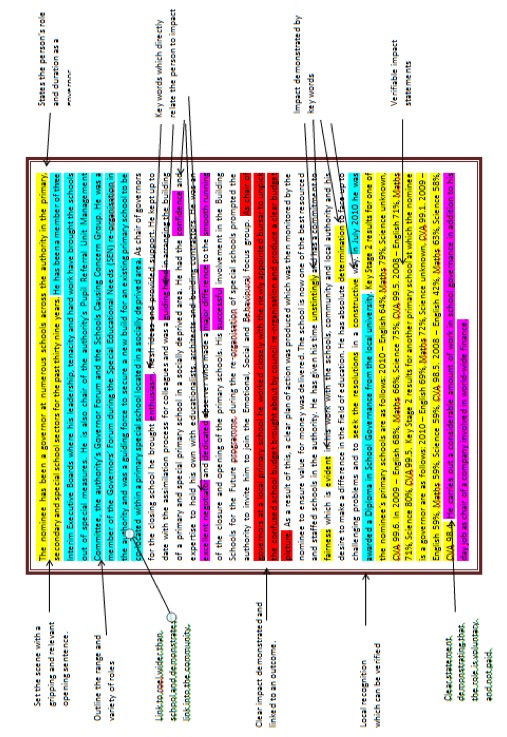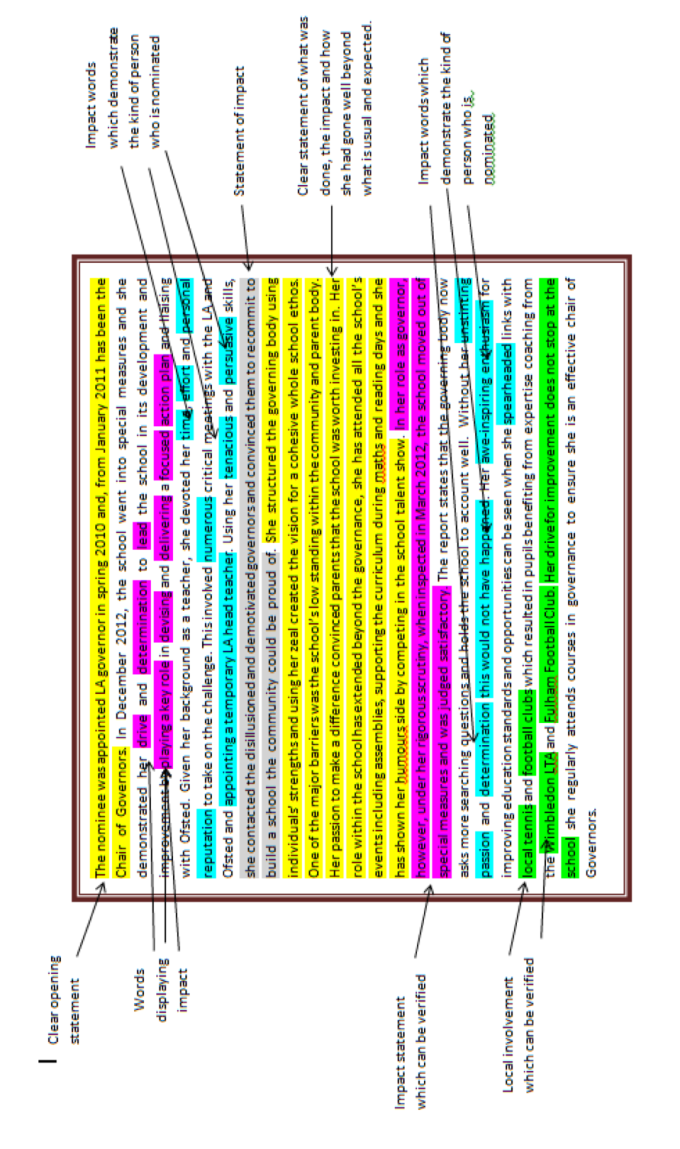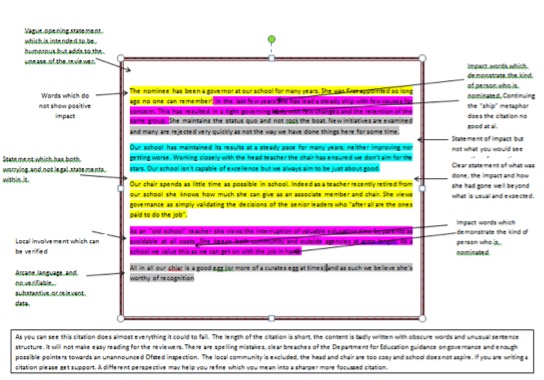
Nominate someone for a Queen’s national honour – all it costs is your time
Download probably the most widely read “How to” guide in text, PDF or word from this site;
here |
| Nominate someone – all it costs is your time |
| This guide was written to help ordinary people like you and me to nominate others for recognition within the UK national honours system.
It is not an official guide but has been written drawing onthe official and unofficial sources available.
There is now a short official guide from the Cabinet Office: Here
Written by Martin Matthews a part of the movement to nationally recognize more governors.
With thanks to Julia Skinner for editing and sage advice. |
|
Introduction
Many great volunteers give their time quietly week in and week out. They don’t seek recognition but maybe they deserve it?
I am a volunteer, I give my time to school governance.
The reasoning behind developing this process is to support and guide people who want to nominate anyone for recognition within the national honours system.
The honours system was changed several years ago to help ordinary people like you and me to nominate anyone for recognition.
It’s not the intention of this process to become a publicity machine for anyone; simply to enable local people to nominate those they know. We aim to support the best quality and rounded citations to maximize the potential recognition.
What we can offer you
- Guidance with the process
- Support to gather information for the citation
- Support to write, edit and refine the citation
- Support to complete the nomination form
You own the nomination, we support you.
Quick check
This quick checklist should give you a basic idea of how strong a nomination could be….
- Has the person demonstrated outstanding volunteering? Volunteering for a long time is not enough. There is intense competition and the nominee must be outside the ordinary.
- Has the person changed things especially by solid, practical achievement?
- Has the person’s work has brought distinction to British life or enhanced the UK’s reputation in their area or activity?
- Has the person demonstrated the impact of their volunteering? Preferably this must be beyond a single place.
- Does the person do other voluntary activities for their community?
If you answered yes there could be the potential to nominate that person.
Any nomination solely based on length of service is unlikely to succeed.
No matter what you answered you can still nominate someone. Competition for honours is fierce and this is only intended as a guide.
Where to start?
There are no deadlines for applications and people can submit their nomination at any time of year. Awards are announced at New Year (end of December) and for the Queen’s Birthday (mid-June). It usually takes 12 to 18 months to process a nomination because of the background work undertaken by Cabinet Office officials. Initially a nomination is assessed by a committee from the area the person volunteers, then by a cabinet office committee that reviews all nominations.
You do not nominate a person for a specific award. You make the nomination and the process decides on the level of award.
Background checks with the police and substantiating claims made in the citation are rightly taken very seriously. Checks including HMRC are routinely made. Where claims are made relating to organisations data checking and speaking to people within those organisations may happen. Some honours exclude people with criminal records for certain offences (particularly violence or fraud). Do not exaggerate or make false claims under any circumstances.
Ideally nominations should be made while the nominee is still in service and at least 12 months before they retire or step down. A person nominated post retirement is not likely to be successful.
Don’t delay making a nomination. I regret not putting a friend of mine forward for recognition sooner.
Individuals are approached a month before the award is announced to see if they would accept the award. People do turn down recognition. This is their personal philosophy and should be respected.
It is not possible to nominate yourself. If you choose to nominate someone it is not advisable to tell them, they may be disappointed.
British Empire Medal
Awarded for a ‘hands-on’ service to the local community. This could be a long-term charitable or voluntary activity, or innovative work of a relatively short duration (3 to 4 years) that has made a significant difference.

The Citation
Nominating someone has two parts,
- the citation written by the nominator
- supporting letters; written by people to confirm why you are nominating that person.
The citation is the only evidence that most people involved in the process will see about your nominee.
You need to take the following into consideration;
- There is considerable competition for honours, each nomination faces rigorous evaluation and decisions are based on the information on the citation form.
- The quality of the citation is the key to the success of the nominee. A fantastic volunteer may not achieve recognition if the citation is badly written. Having said that your citation doesn’t need to be a work of art – it doesn’t matter whether it’s typed or handwritten or whether it has pictures. There isn’t a right way or a wrong way to write a nomination and it doesn’t need to be particularly formal.
- A citation should not be an extended CV, a list of educational achievements, appointments, awards or posts, or a job description showing what the person has done.
- A frequent complaint is that poor citations often list these things, and that the person recommended is “doing no more than their paid job”. You may know the person well and forget they are a volunteer – remember to mention that.
- Your citation should describe what is special about your nominee’s achievements and show memorably and persuasively how and where they have made a difference.
Honours committees actively look for evidence of nominees who have gone above and beyond. Committees are pragmatic about this; evidence that the nominee is giving back to society will strengthen a case.
Committees regularly discount citations which do not demonstrate wider commitment: competition for honours is so strong that this is often the dividing line between a successful and unsuccessful nomination. You must make it clear where someone’s activities are extra to the “standard” role – if the committee is unsure they will assume that what is being described is paid activity. Be clear.
The citation sets out the grounds for the recommendation and should concentrate only on the nominee’s main achievements. When drafting a citation, you should consider why you are making the nomination now. It should be clear within the first few lines why a nomination is being made, and the rest of the text should be used to provide evidence to substantiate this.
It is important that the details given are accurate. The nominee may take some time to come through the Departmental selection process and be considered on more than one occasion. The information given in the citation may be checked regularly and updated where necessary as the nomination winds its way through the process.
They look for people who have made a significant contribution and have added extra value to their roles.
Long Citation Writing
Like any piece of persuasive writing, the opening sentence is the hook for the reader. Many citations fail as they don’t convey what the reviewers need. What is the essence of why you are nominating this person?
Write to your audience.
Write for the audience of the reviewer. Would someone who does not know the nominee understand what you are trying to say? Think about how you would explain the nomination to the person if they were sat in front of you.
Citations should be ordered to start with major achievements, then supporting facts and career details last and should tell the story of your nominee.
Do your research so you know what you want to say. Plan before you write, it will be much easier to get it down on paper.
Read your work carefully. Check and edit, check and edit. Get someone else to read it.
Fresh eyes can find missed basic grammar or spelling mistakes. Tell a compelling story about your nominee. There isn’t a right or wrong length of citation but stick to the point. Keep your reader in mind all the time
Citation: Content tips
- Grip your reader with a good opening sentence that tells the committee why they should receive an honour.
- Stick to the point and do not waffle.
- Archaic and pompous language won’t do your nominee any favours.
- Talk about the individual personally like a job application
- Use real life examples and use dates/comparative data that can be understood.
- Explain how the person gives above and beyond to deliver lasting results.
- Describe how things were before they began and how they are now.
- Explain how your nominee is different from others doing the same thing?
- Describe why should they be recognised now? (And particularly: is there a time factor involved – an anniversary, a launch?)
- Explain how they earned the respect of their peers and become a role model in their field?
- Describe how they have produced (perhaps against the odds) sustained achievement which has required moral courage, vision, the ability to make tough choices or determined application and hard work.
- Explain why they volunteered and if all their peers do this kind of activity.
- Describe how their work is different to their predecessor.
- Identify what makes this person different from others in the same position.
- Explain how the work has a Local/Regional/National/International reach.
- Explain how they have an impact at a higher level? A local volunteer may also mentor people on a regional or national level.
- Look for any dates or indications of how recent the achievements were carried out. For honours, work carried out more than 3-5 years ago is probably too long ago. Unless it is part of a consistent sustained activity, that is the basis of the nomination.
Member of the Order of the British Empire (MBE)
Awarded for an outstanding achievement or service to the community. This will have had a long-term, significant impact and stand out as an example to others.

Citation: format tips
- You can write as much as you want but will it be read? Write vividly and clearly.
- Keep your sentences short and to the point. No more than 15 words are best.
- Your citation should be in full sentences and should not use bullet points.
- Avoid jargon or technical language.
- It’s fine to use acronyms but unless they are very common (like BBC) you should always explain what they are the first time you use them. For example, “Gill has worked with our Local Authority (LA) to xxx”
- Do not change any aspect of the form such as the font. It calls into doubt the whole application.
- Do not send the text in on a separate page.
- DO NOT include quotation marks, italics, underlined or bold text, or put in paragraph breaks.
Think about which words have most impact
With the limited space for writing the citation the choice of a short but impactful word can help you shape the whole tone. This will support the reviewer in their decision making.
Effective nominations often include nouns such as:
- determination commitment respect certitude
- drive sustainability recognition positivity sincerity
- innovation creativity selflessness alacrity
- impact zeal performance passion diligent
- ambassador conscientious inspirational
- purposefulness resoluteness grit meticulous
adjectives such as:
- trusted unstinting conscientious astute
- wise inspirational peerless shrewd
- persuasive passionate exemplary
- resourceful enthusiastic fair
- tenacious sympathetic admired
- unflustered supportive vibrant
- dogged articulate diligent unruffled
- dedicated expertise professionalism
- instrumental creative resourceful
- unstinting tenacious exemplary
and phrases such as:
- making a difference
- role model by xxxx
- going the extra mile
- role model
- overcoming obstacles
- head and shoulders above the rest
- personally responsible
- the latest Ofsted report states that governance is XXXX
- XX listened to and the acted on
Officer of the order of the British Empire (OBE)
This is awarded for having a major local role in any activity, including people whose work has made them known nationally in their chosen area.

Supporting Letters
The official advice is that two letters of support would be sufficient. With increasing competition between 5 and 20 letters of support are more likely to be successful.
Supporting letters well written will have a supportive effect. Badly written ones will not help.
Coordinating and advising people with supporting letters are the main administrative aspect of the process. Politeness and perseverance are often successful with local politicians. Most people are happy to help.
For a chair of governors consider asking the following to write a supporting letter;
|
|
Date contacted |
Letter written |
| 1 |
Ward Councillor |
|
|
| 2 |
Council cabinet member for education |
|
|
| 3 |
Council Leader |
|
|
| 4 |
MP |
|
|
| 5 |
Foundation Organisation |
|
|
| 6 |
Leaders in the same organisation |
|
|
| 7 |
Council cabinet member for education |
|
|
You may want to consider offering a draft form of supporting letter. This can enable busy people to have a start point and change the letter rather than starting with a blank page. Remember all letters can be submitted via email. Include the correct cabinet office contact email with the draft. Thank people if they confirm they have written a letter of support.
Commander of the Order of the British Empire (CBE)
This is awarded for having a prominent but lesser role at national level, or a leading role at regional level. You can also get one for a distinguished, innovative contribution to any area.

Appendix 1
DO
- Start with a strong sentence that immediately sets the scene.
- Make sure that the information is relevant.
- Highlight the individual achievement starting with the most recent
- Make sure that information is factual and specifics such as dates, job titles and actions they are explicitly linked to the impact the person has made.
- Take full advantage of the 3000 characters.
- Highlight the nominee’s personal contribution referring to substantial achievements wherever possible.
- Set out the grounds for the nomination and be consistent with the short citation.
- Include, where appropriate, mention of the individual’s influence on the practices of colleagues, or on good practice across their community or profession.
- Where relevant, include a small amount of background on the nominee’s organisation if this gives some weight to the scope of the work completed.
- Include dates wherever possible.
- Make sure the form is fully completed
- Please leave fields blank if they are not applicable. (Do NOT put N/A or NONE etc)
DO NOT
- Start the citation with “xxx has been with the organisation for x number of years”. This lacks impact and isn’t relevant, if it must be included, make it the last sentence.
- Use paragraphs, bullet points, acronyms, flowery language, change the font or send the text in on a separate page.
- Include information about the nominee’s education and early career unless it is directly relevant to the nomination.
- Include team achievements such as “he and his team” the committees in the Department and at the Cabinet Office only want information about what the individual did.
- List posts held without an indication of the nominee’s contribution to them
- Include unsubstantiated comments on performance or other “padding”
- Use the nominee’s name; he or she is adequate and will save space.
- Use acronyms or abbreviations unless they are obvious e.g. DfT/DCLG.
- Use such unnecessary comments as “an Honour would be most appropriate recognition of his efforts” – If this were not the case, the nomination should not be put forward. In most cases, there is no need to include a summarizing statement at the end of the citation
Appendix 2
Examples of extracts from persuasive citations:
“She has devoted most of her spare time to running a social club for elderly people with learning difficulties. She says such people are sadly neglected in society and, although she is in full-time employment in a Tesco store, she runs this club with two helpers, a small budget and a lot of hard graft. Over the past five years, more than 200 people have benefited from the facilities, as well as their carers who have been given valuable respite from their responsibilities.”
“He lived on an estate with high numbers of single mothers and disaffected young people but, instead of moaning about the youth of today, he started to listen to them and, as a result, started a club with sporting activities and facilities for mothers and their children. This is now used by 500 local teenagers. He had to work hard to gain the support of police and other agencies but was determined to succeed. Now, a once crime-ridden, hugely unpopular estate, is thriving with a real sense of purpose and achievement and crime rates have plummeted.”
“She has transformed the agency from an organisation troubled by high profile technical operational challenges into a highly effective body with 96% of customers satisfied with the services her staff provide. The IT system is user friendly and a model of good practice.”
“He found that the charity was wasting over a £1m a year on time-consuming inefficient administration and had no effective PR. He altered procedures, reduced staff and adopted a ‘can do’ approach by putting the people the organisation was supposed to be helping at the top of his priority list, rather than at the bottom.”
“When she took over the company it was running at an annual loss of £4.2m and it took her five years to produce a healthy profit of £2.5m. She has maintained a steady increase in profits since 2001 with a £.7.2m profit in year ended March 2006. Employees have increased from 356 to 870 in her time, in an area of high unemployment following the closure of the local car plant”
“For over 40 years he has been a prolific fundraiser in the community. Since 1970 he has stood outside the local supermarket every Saturday in all weathers rattling his tin for good causes. He has during this time raised around £40,000 for the local hospice and the Old Rectory Club for disabled people. On retirement in 1990 he began to organise bingo nights three times a week at three different village halls and also arranges a monthly dance. These activities have brought the community together and have helped to raise over £15,000 for several local charities.”
“She is unusual because she is a black woman farmer in a rural county but she is keen to rid the world of stereotypes and uses her status to promote diversity and encourage women from non-British ethnic backgrounds to try different careers, particularly in male dominated industries like agriculture.”
“Although in full-time employment in local government, he gives up two evenings a week and all day Sunday to helping in the hospice. He has managed their very complex finances and is prepared to help behind the scenes or on the frontline, wherever he is most needed. He has contributed his services consistently for the last 32 years.”
“She has been the under-16s football team coach for 15 years. During the season she gives up every Tuesday evening for training and every Sunday for matches against other local teams. It is a testament to her success as a coach that there are now enough junior members for two boys’ and a girls’ team. She has undertaken all manner of tasks to support the club, from mowing the pitch to acting as club secretary. She organised several fundraising tournaments to raise £4,000 towards renovation of the football pitch and clubhouse, a facility now used by the whole community for village events.”
Knight/Dame of the Order of the British Empire (KBE/DBE)
This is awarded for having a major contribution in any activity, usually at national level. Other people working in the nominee’s area will see their contribution as inspirational and significant, requiring commitment over a long period of time.

Example citations for governors (available on National Governance Association website)
Example governor citation 1
The nominee has been a governor at numerous schools across the authority in the primary, secondary and special school sectors for the past thirty-nine years. He has been a member of three Interim Executive Boards where his leadership, tenacity and hard work have brought the schools out of special measures. He is also chair of the authority’s Pupil Referral Unit Management Committee, the authority’s Governor Forum and the Schools Causing Concern Group. He was a member of the Governors’ Forum during the Special Educational Needs (SEN) re-organisation in the authority and was a guiding force to secure a new build for an existing primary school to be co-located within a primary special school located in a socially deprived area. As chair of governors for the closing school he brought enthusiasm, fresh ideas and provided support. He kept up to date with the assimilation process for colleagues and was a guiding hand in arranging the building of a primary and special
primary school in a socially deprived area. He had the confidence and expertise to hold his own with educationalists, architects and building contractors. He was an excellent negotiator and dedicated observer who made a major difference to the smooth running of the closure and opening of the primary schools. His successful involvement in the Building Schools for the Future programme during the re-organisation of special schools prompted the authority to invite him to join the Emotional, Social and behavioural focus group. As chair of governors at a local primary school he worked closely with the newly appointed bursar to unpick the confused school budget brought about by council re-organisation and produce a clear budget picture. As a result of this, a clear plan of action was produced which was then monitored by the nominee to ensure value for money was delivered. The school is now one of the best resourced and staffed schools in the authority. He has given his time unstintingly and has a commitment to fairness which is evident in his work with the schools, community and local authority and his desire to make a difference in the field of education. He has absolute determination to face up to challenging problems and to seek the resolutions in a constructive way. In July 2010 he was awarded a Diploma in School Governance from the local university. Key Stage 2 results for one of the nominee’s primary schools are as follows: 2010 – English 64%, Maths 79%, Science unknown, CVA 99.6. In 2009 – English 68%, Maths 66%, Science 75%, CVA 99.5. 2008 – English 71%, Maths 71%, Science 80%, CVA 99.5. Key Stage 2 results for another primary school at which the nominee is a governor are as follows: 2010 – English 69%, Maths 72%, Science unknown, CVA 99.1. 2009 – English 59%, Maths 59%, Science 59%, CVA 98.5. 2008 – English 42%, Maths 63%, Science 58%, CVA 98.4. He carries out a considerable amount of work in school governance in addition to his day job as chair of a company involved in world-wide finance.
The recently published Cabinet Office “how to” has some disguised examples from persuasive citations:
https://assets.publishing.service.gov.uk/government/uploads/system/uploads/attachment_data/file/902346/08684-How_to_write_a_nomination.pdf
“She has devoted most of her spare time to running a social club for elderly people with learning difficulties. She says such people are sadly neglected in society and, although she is in full-time employment in a Tesco store, she runs this club with two helpers, a small budget and a lot of hard graft. Over the past five years, more than 200 people have benefited from the facilities, as well as their carers who have been given valuable respite from their responsibilities.”
This nominee is helping others voluntarily and in doing so has helped and made life better for many others. It’s very clear that she is the key person getting the club going and the nomination also makes clear the number of people who have benefited from her work.
“He lived on an estate with high numbers of single mothers and disaffected young people but, instead of moaning about the youth of today, he started to listen to them and, as a result, started a club with sporting activities and facilities for mothers and their children. This is now used by 500 local teenagers. He had to work hard to gain the support of police and other agencies but was determined to succeed. Now, a once crime-ridden, hugely unpopular estate, is thriving with a real sense of purpose and achievement and crime rates have plummeted.”
This nominee has taken the initiative to do something to help his community. He has identified a need and started something from scratch to make things better for others. And he has been very successful: the figures in the nomination make clear the level of the impact he has had.
“She has transformed the agency from an organisation troubled by high profile technical operational challenges into a highly effective body with 96% of customers satisfied with the services her staff provide. The IT system is user friendly and a model of good practice.”
This example demonstrates that the nominee has personally turned around a failing company and in doing so has made it an exemplar for others.
“He found that the charity was wasting over a £1m a year on time-consuming inefficient administration and had no effective PR. He altered procedures, reduced staff and adopted a ‘can do’ approach by putting the people the organisation was supposed to be helping at the top of his priority list, rather than at the bottom.”
This is another example of a nominee who has fundamentally changed an organisation for the better and whose leadership has made sure that that charity focused on the right things.
“When she took over the company it was running at an annual loss of £4.2m and it took her five years to produce a healthy profit of £2.5m. She has maintained a steady increase in profits since 2001 with a £.7.2m profit in year ended March 2006. Employees have increased from 356 to 870 in her time, in an area of high unemployment following the closure of the local car plant”
This nominee has made a sustained effort which has not just got the company but on track but actually made it more profitable. That success has given a boost to employment in an area which really needs it.
“For over 40 years he has been a prolific fundraiser in the community. Since 1970 he has stood outside the local supermarket every Saturday in all weathers rattling his tin for good causes. He has during this time raised around £40,000 for the local hospice and the Old Rectory Club for disabled people. On retirement in 1990 he began to organise bingo nights three times a week at three different village halls and also arranges a monthly dance. These activities have brought the community together and have helped to raise over £15,000 for several local charities.”
This nominee has given his time and effort over decades and in doing so has both supported local causes and helped to support the community in his rural area.
“She is unusual because she is a black woman farmer in a rural county but she is keen to rid the world of stereotypes and uses her status to promote diversity and encourage women from non-British ethnic backgrounds to try different careers, particularly in male dominated industries like agriculture.”
This nominee is a role model for others, achieving in her field of activity but also supporting other people.
“Although in full-time employment in local government, he gives up two evenings a week and all day Sunday to helping in the hospice. He has managed their very complex finances and is prepared to help behind the scenes or on the frontline, wherever he is most needed. He has contributed his services consistently for the last 32 years.”
This nominee has made a sustained contribution over a long period, devoting much of his free time to others. He has offered unconditional support to the benefit of others.
“She has been the under-16s football team coach for 15 years. During the season she gives up every Tuesday evening for training and every Sunday for matches against other local teams. It is a testament to her success as a coach that there are now enough junior members for two boys’ and a girls’ team. She has undertaken all manner of tasks to support the club, from mowing the pitch to acting as club secretary. She organised several fundraising tournaments to raise £4,000 towards renovation of the football pitch and clubhouse, a facility now used by the whole community for village events.”
This nomination makes clear that the nominee has given up a lot of time to local children and that, by being willing to turn her hand to anything, she has been the driving force behind the club’s success.

Example governor citation 2
The nominee was appointed LA governor in spring 2010 and, from January 2011 has been the Chair of Governors. In December 2012, the school went into special measures and she demonstrated her drive and determination to lead the school in its development and improvement by playing a key role in devising and delivering a focused action plan and liaising with Ofsted. Given her background as a teacher, she devoted her time, effort and personal reputation to take on the challenge. This involved numerous critical meetings with the LA and Ofsted and appointing a temporary LA head teacher. Using her tenacious and persuasive skills, she contacted the disillusioned and demotivated governors and convinced them to recommit to build a school the community could be proud of. She structured the governing body using individuals’ strengths and using her zeal created the vision for a cohesive whole school ethos. One of the major barriers was the school’s low standing within the community and parent body. Her passion to make a difference convinced parents that the school was worth investing in. Her role within the school has extended beyond the governance, she has attended all the school’s events including assemblies, supporting the curriculum during maths and reading days and she has shown her humorous side by competing in the school talent show. In her role as governor, however, under her rigorous scrutiny, when inspected in March 2012, the school moved out of special measures and was judged satisfactory. The report states that the governing body now asks more searching questions and holds the school to account well. Without her unstinting passion and determination this would not have happened. Her awe-inspiring enthusiasm for improving education standards and opportunities can be seen when she spearheaded links with local tennis and football clubs which resulted in pupils benefiting from expertise coaching from the Wimbledon LTA and Fulham Football Club. Her drive for improvement does not stop at the school she regularly attends courses in governance to ensure she is an effective chair of Governors.

Example governor citation 3
I have written the following example as a clear example of what not to do. It could be that you write your citation with the very best of intentions but without editing or support it may not read how you expect. To achieve what you want you are advised to seek support from someone else. A fresh pair of eyes and a clear understanding of what you are trying to say will do the citation no harm.

Example of supporting letter
Current nomination form
This is available at https://www.gov.uk/government/publications/nominate-someone-for-a-uk-national-honour

 Over recent weeks I’ve seen many descriptions of how governors (maintained schools) play their part in pay decisions. Some comments have been a bit askew, others plain illegal. What this says is that some head teachers do not understand the role of governors have in teachers’ pay.
Over recent weeks I’ve seen many descriptions of how governors (maintained schools) play their part in pay decisions. Some comments have been a bit askew, others plain illegal. What this says is that some head teachers do not understand the role of governors have in teachers’ pay.











